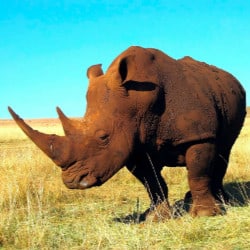Three Rare Javan Rhino Calves Born

There was some good news on the rhino conservation front. According to a report by National Geographic, there is evidence which suggests the critically endangered Javan rhino is reproducing in Indonesia’s Ujung Kulon National Park. The park serves as home to the last 60 Javan rhinos on the planet. Video taken from the park’s camera traps show there are now three new rhino calves. The footage shows there is cause to be optimistic says Barney Long director of species conservation for WWF who maintain the camera traps.
“It is evidence that Javan rhinos are reproducing in the wild, I think the key thing to remember is that [these] rhinos are recovering. The videos demonstrate that with the right conservation measures, you get more babies.” Mr. Long said in an interview with National Geographic.
The Javan Rhino Used To Roam Throughout Asia
The Javan rhino used to roam all the way from Northeastern India, throughout South East Asia including Myanmar, Thailand, Vietnam, Laos, Cambodia as well as Java and Sumatra in Indonesia. Over the last 150 years, their range and population have declined drastically as a result of poaching and habitat loss. Today their last refuge remains the Ujung Kulon National Park. There is reason to have hope however. In the last 50 years, the population of Javan rhinos has slowly doubled, though there are two things that could affect the fate of the species. Close by too Ujung Kulon National Park is Anak Krakatau which is an active volcano which could erupt and wipe out the species. The second risk is that the number of Javan rhinos could reach the maximum number the park is physically able to sustain.
As populations rise birth rates fall
According to National Geographic, a female rhino gives birth to a calf once every three to five years, however when the population of rhinos becomes dense, the number drops off. In order to keep the Javan rhino birth rate stable as their numbers grow, Mr. Long says WWF is seeking another home for this rare species.
“We need a lot more attention paid to this species,” Long told National Geographic. “We can recover it, we know how to recover it … we just need to make sure the world is paying attention.”



